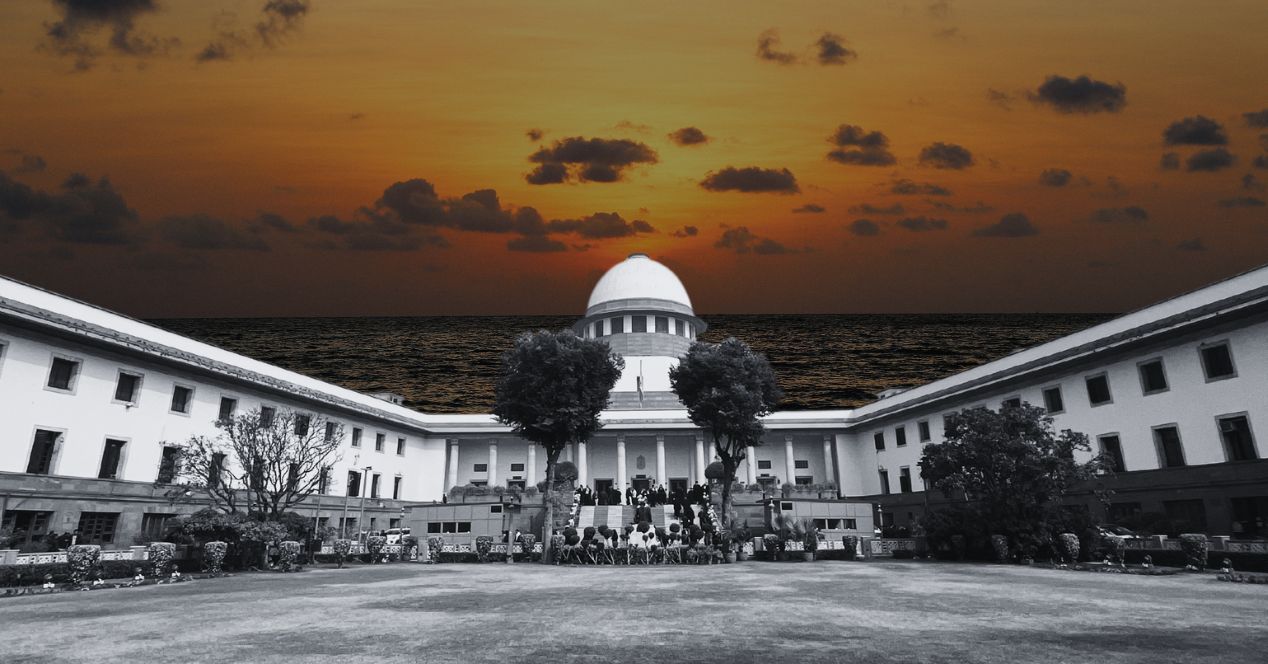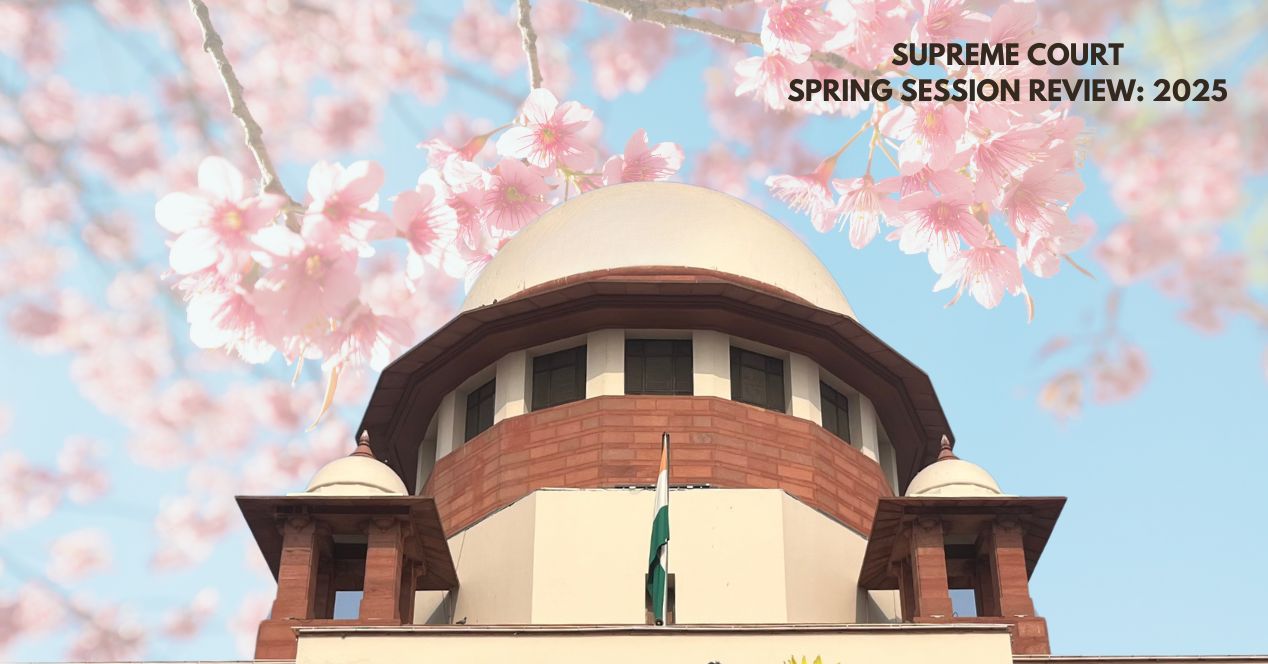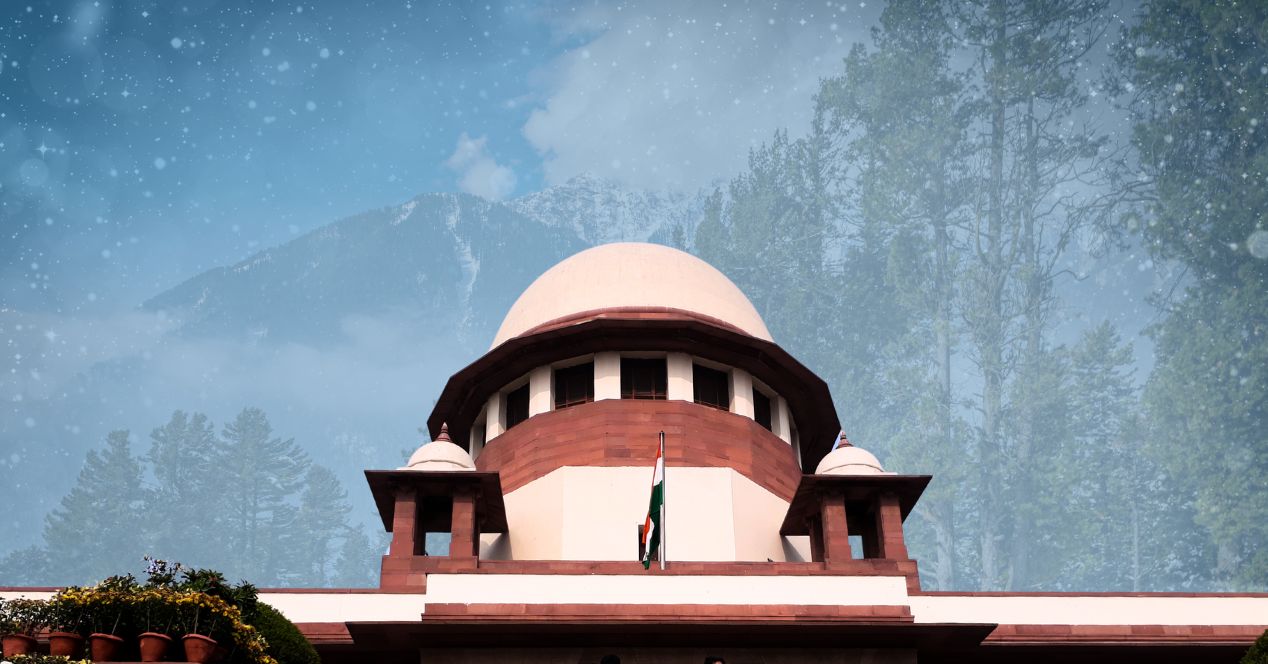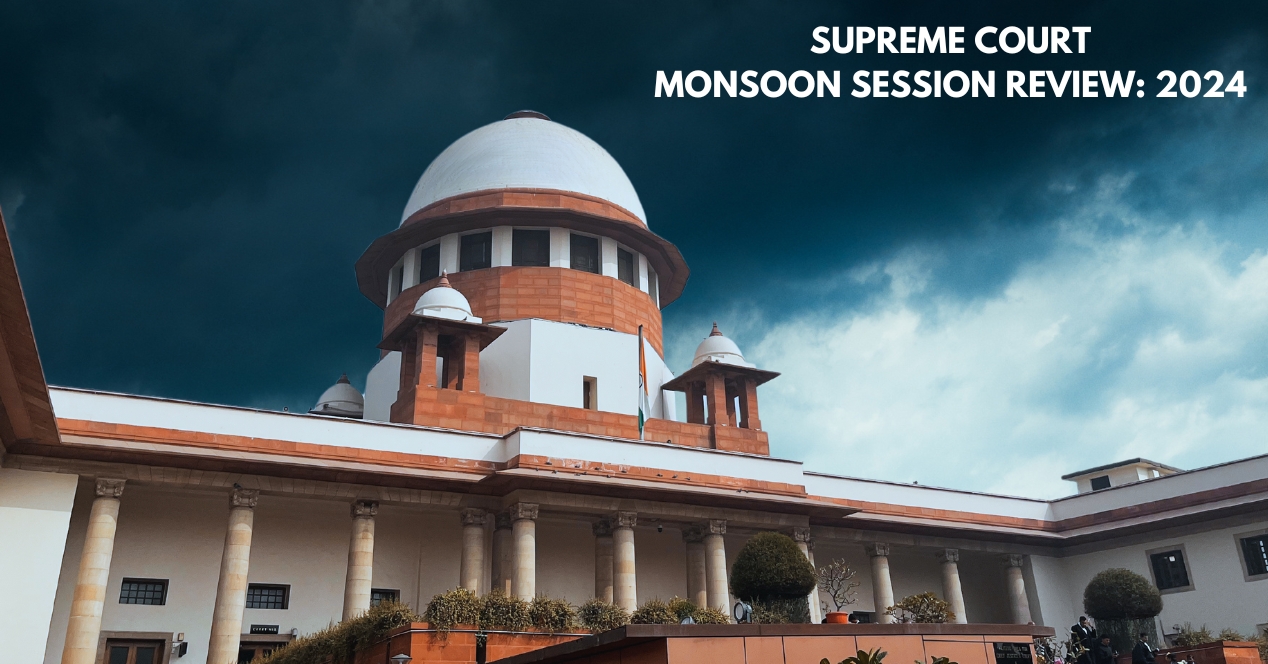Analysis
2025 Monsoon Session Review
This monsoon session, the Court heard two Constitution Bench cases, saw two new appointments and delivered key judgements
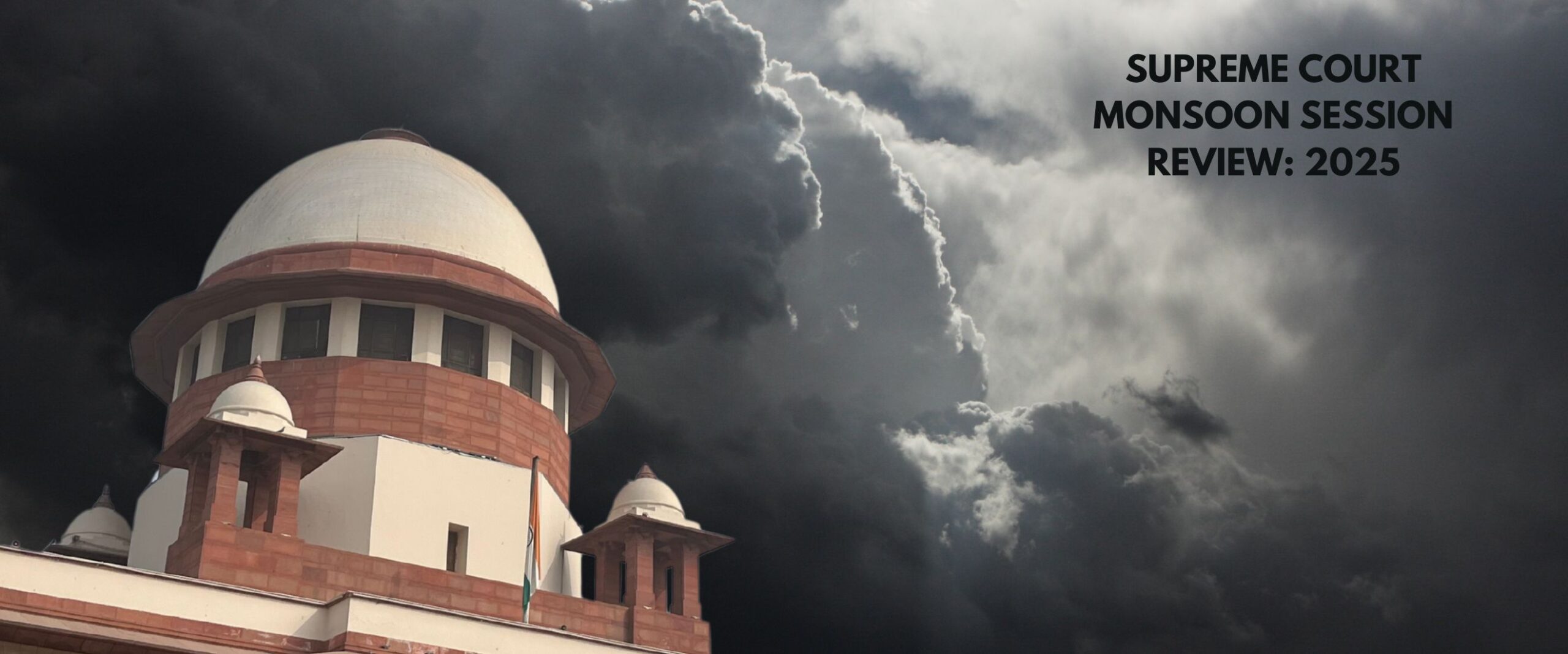
This is a review of the Supreme Court’s monsoon session, spanning 14 July to 30 September 2025. While the Supreme Court lacks an official session calendar, for analytical clarity, we at the Supreme Court Observer have divided it into four sessions: Spring (January to March), Summer (April to June), Monsoon (July to September), and Winter (October to December).
The monsoon session of the Supreme Court saw arguments in a Presidential Reference, a Constitution Bench, new appointments, a retirement and key administrative changes. A Constitution Bench of five-judges heard the Presidential Reference on the discretionary powers of the President and the Governor when granting assent to state bills. Subsequently, a Constitution Bench heard a case pertaining to the appointment of judicial officers as District Judges under the Bar quota. Both of these Benches were led by Chief Justice B.R. Gavai.
This review unpacks the key developments that took place in the top court during this period.
Quick facts
Working days: The Supreme Court worked for 52 days between 14 July to 30 September 2025 after it returned from its Partial Court Working Days. The CJI had constituted 21 benches during the Partial Working Days which commenced from 26 May to 11 July.
Quorum: Currently, the Court has a working strength of 34 judges. At the start of the Monsoon Session, the Court had 33 sitting judges.
Appointments and retirements
On 9 August 2025, Justice Sudhanshu Dhulia retired after a three-year long tenure. He was elevated to the top court in May 2022.
With Justice Dhulia’s retirement, there were two vacancies in the top court. The CJI Gavai-led Collegium recommended the appointment of Justices Alok Aradhe and V.M. Pancholi.
The appointment of Justice Pancholi sparked controversy when media reports indicated that Justice B.V. Nagarathna, a member of the Collegium, dissented against his appointment. Reportedly, she had stated that his appointment would be “counter-productive” for the top court. Notably, Justice Pancholi is in line to be the 60th CJI in 2031.
Constitution bench decisions
None
Constitution bench hearings
- Presidential Reference on the powers of the Governor and the President—five-judge bench—judgement reserved on 11 September 2025
- Direct recruitment of District Judges under the Bar Quota—five-judge bench—judgement reserved on 25 September 2025
Pendency
- 26 five-judge bench matters with 185 tagged matters
- 6 seven-judge bench matters with 35 tagged matters
- 4 nine-judge bench matters with 53 tagged matters
Total pendency: 88,625 cases
(data collected from the National Judicial Data Grid on 30 September 2025)
Constitution bench hearings
Assenting powers of the Governor and President
On 11 September, a Constitution Bench reserved judgement in the Presidential Reference concerning the scope of the Governor’s and President’s powers when granting assent to state bills. President Droupadi Murmu had invoked the Court’s advisory opinion under Article 143 a month after the Supreme Court delivered the Tamil Nadu Governor Judgement. The Judgement had held that the Governor had no discretion when granting assent to state bills. It had also imposed timelines for granting assent.
Multiple states such as Kerala, Tamil Nadu, West Bengal, Karnataka, Himachal Pradesh and Punjab opposed the reference, arguing that the Governor cannot exercise absolute veto on bills passed by state assemblies. The Union government had a different view and argued that the Governor may exercise discretion on the bills and cannot be reduced to the role of a “postman”. Joined by the Union were states such as Madhya Pradesh, Maharashtra, Rajasthan, Orissa, Goa and Chattisgarh.
Our argument matrix gives the key arguments put forth by the states and the Union. Our case page has the documents and detailed hearing reports from the 12 days of hearings.
The State of Kerala had filed a separate petition against its Governor over delays in granting assent to bills. The state withdrew its petition from the Supreme Court in July, shortly before arguments began in the Presidential Reference
Direct recruitment of Judicial Officers as District Judges
On 25 September, a Constitution Bench, also led by CJI Gavai, reserved judgement on whether judicial officers can be appointed as district judges under the Bar quota. The key provision in the case was Article 233, which deals with the appointment of District Judges. Petitioners had argued that Article 233(2) does not prohibit judicial officers from being recruited under the Bar quota provided they had practised as an advocate for seven years—a requirement under the provision.
Respondents, including High Courts which regulate District Judge appointments, contended that the constitutional scheme only allows the appointment of judicial officers by way of promotion and cannot be mixed within the Bar quota.
Our arguments matrix covers the key contentions. Find hearing reports from all three days of hearings on our case page.
Division Bench decisions and hearings
Supreme Court stays key provisions of the Waqf Amendment Act
On 15 September 2025, a Division Bench of CJI Gavai and Justice A.G. Masih refused to stay the entirety of the Waqf (Amendment) Act, 2025. The Act was challenged by politicians and civil rights groups on grounds that it discriminates against the Muslim community. The Court pointed out that the petitioners had failed to demonstrate that the Act was manifestly arbitrary and that statutes can only be struck down in rare circumstances.
The Court stayed the mandate of practicing five years of Islam for establishing a waqf, pointing out that the law did not provide a mechanism to determine that. It also stayed the provision allowing a designated officer to determine whether a property was a waqf or not. It explained that such an approach would violate the separation of powers and only a judicial or quasi-judicial authority can take such a decision. Our judgement summary on the interim plea and judgement matrix provides a detailed breakdown of what the Court held. Our desk brief examines the implications of the stay judgment and features insights from the petitioner’s advocates.
Applicability of RTE on minority institutions referred to a larger bench
On 1 September 2025, in Anjuman Ishaat-e-Taleem Trust v The State of Maharashtra, a Division Bench of Justices Dipankar Datta and Masih held that teachers with more than five years of experience must clear the Teacher’s Eligibility Test (TET) under the Right to Education Act, 2009 (RTE).
It noted that according to Pramati Educational and Cultural Trust v Union of India (2014), the RTE Act was held not applicable to aided or unaided minority educational institutions. However, it found that Pramati Educational and Cultural Trust had arrived at such a conclusion without elaborate reasoning. It found that the blanket exclusion of minorities was questionable and referred its correctness to a larger bench.
Clean chit for Vantara
On 15 September, a two-judge Bench of Justices Pankaj Mithal and P.B. Varale accepted the findings of a Special Investigation Team (SIT) and closed all complaints against Vantara, the wildlife rescue and conservation initiative run by the Reliance Foundation.
The Court noted that the SIT had examined all of Vantara’s animal import paperwork and found it in compliance. The Bench stated it had “no hesitation” in accepting the SIT’s conclusions, particularly since Vantara had been subject to judicial scrutiny numerous times in the past and the allegations against it had been rejected “most of the times at every level/forum.” The Court concluded that it would be “wholly unjustified” to allow the cycle of speculative complaints to continue after such “authoritative determinations.”
In a directive, the Court ordered the SIT’s complete report to remain under “sealed cover” (meaning it would not be made public). However, it simultaneously directed that a copy of the same report be handed over to Vantara for its “own use and record.”
Lastly, the Court stated that Vantara could prosecute any publication for “for the deletion of any offending publication” as well as for defamation or private complaints. Our piece critically examines the Supreme Court’s clean chit to Vantara here.
Electoral roll revision in Bihar
The Supreme Court began hearing petitions challenging the validity of the Special Intensive Revision of Electoral Rolls in Bihar. The petitioners had approached the Court arguing that the electoral revision was an exercise that effectively amounted to a citizenship determination, which falls outside the mandate of the Election Commission of India.
The petitioners contended that the exercise excludes the Aadhaar card from the list of the required documents which has the widest coverage. This exclusion would lead to massive deletions from the electoral rolls, they argued. On 8 September, the Court directed that the Aadhaar be included as a document for the exercise. It clarified that the card was only for identification and would not be a proof of citizenship.
Arguments will continue on 7 October.
Reviewing the PMLA judgement
A Bench of Justices Surya Kant, Ujjal Bhuyan and N.K. Singh started hearing arguments in the review petition seeking a relook of the Court’s 2022 decision in Vijay Madanlal v Union of India. That ruling had upheld the Enforcement Directorate’s (ED) sweeping powers under the Prevention of Money Laundering Act, 2002.
The Union government contested the maintainability of the review arguing that the questions were settled in the Vijay Madanlal judgement. The Court is yet to complete arguments in the case.
Catching strays
In August, a Bench led by Justice Vikram Nath modified an Order that had directed the permanent detention of stray dogs in the NCR region to shelters with mandatory sterilisation. The original order authored by Justice J.B. Pardiwala had received widespread criticism and backlash from animal rights organisations and dog lovers.
The Nath-led Bench observed that the earlier Order was “harsh”, “idealistic” and unworkable given the lack of municipal infrastructure. The Bench ordered the setting up of feeding zones and directed individual petitioners and NGOs to deposit funds to develop municipal facilities.
Comedians directed to apologise
On 25 August, a Justice Kant-led Bench directed comedians Samay Raina, Sonali Thakkar and others to apologise for their comments mocking persons with disabilities. The Order arose from an intervening application filed by the Cure SMA Foundation in the Ranveer Allahbadia case. Allahbadia and other comics had approached the Court after First Information Reports (FIRs) were filed against them in the aftermath of the India’s Got Latent controversy.
In another free speech case, the Court quashed an FIR filed against Ashoka University Professor Ali Khan Mahmudabad. Mahmudabad had come under scrutiny after Facebook posts on Operation Sindoor. Senior Advocate Kapil Sibal, appearing for Mahmudabad had argued that Mahmudabad’s incarceration amounted to harassment. The Court had granted interim bail to Mahmudabad in May 2025.
Of bails and religious conversions
Umar Khalid’s bail application was heard briefly by a bench of Justices Aravind Kumar and N.V. Anjaria. Khalid had approached the Court after the Delhi High Court denied him bail in his case concerning the 2020 Delhi Riots. The Court fixed the hearings on 7 October.
The Court also issued notice in several pleas challenging the anti-conversion laws passed by several states to curb “love jihad”. The petitioners had argued that the law was falsely positioned as “freedom of religion” and was an arbitrary statute prohibiting religious conversion.
Immunity of Speaker when determining disqualification petitions
On July 31, the Supreme Court held that the Speaker of a State Assembly does not enjoy constitutional immunity when acting as an adjudicating authority in disqualification petitions. The Court reiterated that the Speaker functions as a tribunal in this role. The decision came in a petition filed by two members of legislative assembly (MLAs) from the Bharat Rashtra Samithi in Telangana. They argued that there had been a significant delay in deciding the disqualification petitions against ten MLAs who defected to the Congress party. The Court ordered the Speaker to decide the pending petitions within three months.
Parliament to decide Justice Varma’s fate
A Bench of Justices Datta and Masih dismissed Justice Yashwant Varma’s petition challenging the report of an in-house committee which found that he had “active control” over a store room where wads of cash were discovered during a fire fighting operation. The Bench upheld the in-house procedure and described it as a “gap-filling” mechanism, noting that the Constitution was silent on disciplinary measures. The judgement clarified that a fact-finding mission by the in-house committee does not prejudice Justice Varma’s rights in the subsequent proceedings that will take place before Parliament.
Court news
Reservations for staff in the Supreme Court
In July 2025, the Court extended reservations for the Scheduled Caste and Scheduled Tribes employees within its non-judicial staff. The reservation policy, announced on 24 June, stipulated that the SC and the ST community will be entitled to 15 and 7.5 percent reservation. CJI Gavai, speaking to the Hindustan Times, had stated that the Courts’ “actions must reflect” the principles it has laid down in several landmark affirmative action judgements.
Revamped case categorisation system
On the basis of a recommendation by an in-house committee led by Justice P.S. Narasimha, the Court announced a new case categorisation system aimed at eliminating redundancies and overlaps in the previous system..
Stay updated with the Supreme Court Observer Law Reports (SCO.LR)!
SCO.LR is a compilation of judgements delivered by the Supreme Court each week. Our dedicated page has all issues of SCO.LR from January 2025.
Find all judgements from the Monsoon session here—July, August and September.
Check out our SCO.LR page for more!

